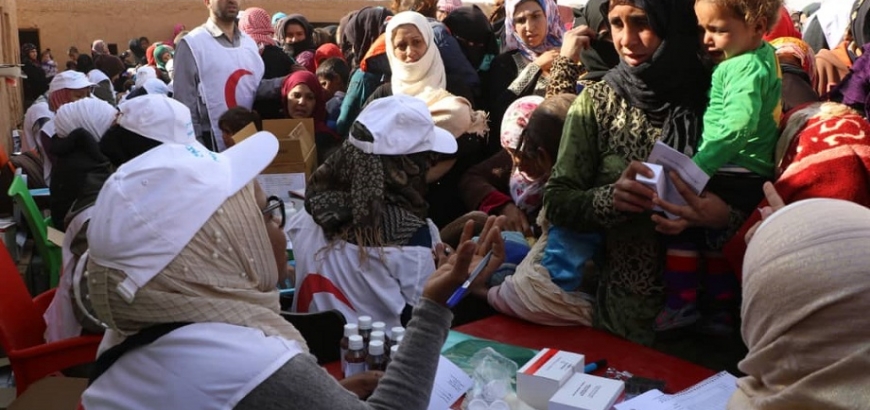Jordan is holding tripartite talks with Russia and the United States, with the aim of dismantling the al-Rukban camp for displaced Syrians, which is located on the border between Jordan and Syria. Amman believes conditions are “appropriate” for displaced people to return to their homes, a prospect which has frightened the camp’s residents.
On Saturday, the Jordanian Minister for Media Affairs, Jumana Ghunaimat, told Middle East Eye that the United States and Russia could help close the camp, while Colonel Muhanad Talaa of the Syrian opposition Revolutionary Commandos Army said that residents feared punishment or conscription if they returned to regime-controlled areas.
In its report, translated by Alsouria Net, Middle East Eye quoted Talaa, who is in charge of security at the al-Rukban camp, as saying that, some camp residents would prefer to be transferred to rebel-held areas in northern Syria.
The al-Rukban camp lies in the Syrian desert, and is three kilometers from northern Jordan. It was established in 2015 as a place to bring together Syrians fleeing the fighting in Palmyra, as well as rural areas of Homs and eastern Hama, which are currently controlled by the regime.
The camp is now under the protection of the US-led coalition, given its proximity to the al-Tanf base, which is controlled by the United States. In a short time, the camp’s population reached 50,000, while the Jordanian government has expressed concerns about its presence.
Collapse of Camp Conditions
On Jun. 21, 2016, fighters from the Islamic State (ISIS) blew up a device which killed seven Jordanian soldiers on a border patrol. This led Jordanian officials to claim that the camp could become a center for the organization. After this incident, Jordan closed its 378 km border with Syria, ending the delivery of humanitarian end and refusing to allow any sick people from the camp to receive treatment in Jordan.
As a result of that, the humanitarian situation in the camp collapsed, with eight children dying at the beginning of January when temperatures fell below zero in the area.
In a press conference with his American counterpart, Mike Pompeo, on Jan. 8, 2019, Jordanian Foreign Minister Ayman Safadi said that Russia, Jordan and the United States should discuss the issue of returning Syrians from the al-Rukban camp to their homes, saying that this must be implemented.
Ghunaimat claimed that Jordan had long said that al-Rukban was a Syrian and international issue and not a problem just for Jordan. “Jordan wants a solution that ends the suffering of the inhabitants of the refugee camp, and Jordan has paid a high price with martyrs dying to support this humanitarian cause.”
She said that the Jordanian-American-Russian talks, “have been initiated to find a solution to the problem of al-Rukban camp. The goal of these talks is to find the proper solution that will allow for the voluntary return of the camp residents back to their homes and towns,” and added that, “Jordan believes that the current situation on the ground allows for the return of the Syrians.”
This Jordanian assurance comes as the United Nations says that the situation is not yet appropriate for Syrian refugees and the displaced to returned to their homes because of the dangers they face.
Fear From the Talks
In this context, Talaa said that he was “not comfortable” with the prospect of the American-Russian-Jordanian discussions to close the camp, and added that, “It is of deep concern to us that Jordan, Russia and the US are negotiating, instead of asking the inhabitants of the camp what they think, or at least having a committee from the camp attend the talks.”
He said that many residents are concerned about returning to regime areas out of fear of punishment or forced conscription by the Assad regime, with others preferring to go to northern areas controlled by the opposition.
Talaa said, “There is a division within the camp between those who want to go to northern Syria and those who say they will only return to their areas if there are international guarantees.”
He expressed his hope that there would be a safe haven opened in northern Syria, “so we can get those who want it to the areas of the moderate opposition in Manbij and Jarablus. “Otherwise, those who want to stay under international protection and don’t want to return to the areas under Syrian regime control should not be forced, because we fear arrest, interrogation and mandatory conscription in the Syrian army.”
The announcement by American President Donald Trump in December about his country’s forces withdrawing from Syria has complicated the situation. A report published by the American Bloomberg agency said on Saturday that the United States would keep a number of its soldiers in the al-Tanf area.
This article was translated and edited by The Syrian Observer. Responsibility for the information and views set out in this article lies entirely with the author.


